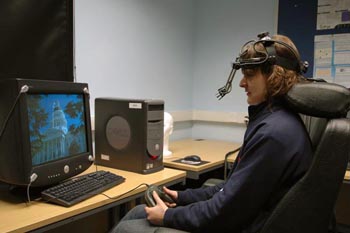Eye is the key to Alzheimer’s Diagnosis

Researchers at Lancaster University and Lytham Hospital have developed new eye-tracking tests that could improve the diagnosis of Alzheimer’s disease. A team led by Dr Trevor Crawford of Lancaster University’s Mental Health Research Unit used a computer-controlled invisible infra-red beam to track the movements of the human eye that are normally too fast to be seen. Researchers monitored the eye as patients attempted to follow or avoid visual targets that were flashed on a screen. The results of this research, which are published this week in the medical journal Biological Psychiatry, found that patients with Alzheimer’s Disease were unable to prevent their eyes glancing towards irrelevant information. Young and elderly healthy observers had no difficulty with the task. The more severe the illness the greater the difficulty the Alzheimer’s Disease patients had in recognizing and correcting their errors. Scientists have known for some time that our eyes are controlled by many of the mental processes that are destroyed by Alzheimer’s Disease. Until now it has not been known which test would be most relevant to the diagnosis of Alzheimer’s Disease. Alzheimer’s Disease is the leading cause of dementia in the UK where 750,000 thousand people suffer from the disease. Medical scientists believe that the benefits of anti-dementia drugs are weakened by the absence of an early diagnostic test for Alzheimer’s Disease. If it were possible to diagnose Alzheimer’s earlier it would enable patients to benefit from early treatment before the disease fully takes hold. Dr Crawford said: “Conventional cognitive assessment for Alzheimer’s disease can be unreliable because patients are often confused by complex psychological tests or unable concentrate for long periods of time. “If these new results are confirmed then we will have a brief and relatively inexpensive procedure to help in the early diagnosis of this devastating disease.” The research was supported and funded by community funds by the Lytham League of Friends